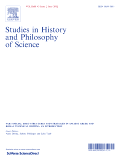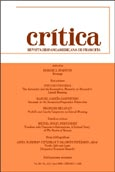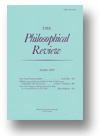
PHILOSOPHY OF SCIENCE
metrics 2024
Navigating the Nexus of History, Philosophy, and Science
Introduction
PHILOSOPHY OF SCIENCE, published by Cambridge University Press, serves as a premier journal at the intersection of history, philosophy, and science, making significant contributions to our understanding of scientific inquiry and its historical contexts. With an impressive impact factor reflected in its 2023 Category Quartiles—ranking Q1 in History, Q1 in History and Philosophy of Science, and Q1 in Philosophy—this journal stands out as a vital resource for researchers, professionals, and students alike. Operating without Open Access, it encourages the dissemination of groundbreaking ideas from 1949 through 2024, illustrated by its robust Scopus rankings, including a remarkable 98th percentile in the History category. Based in the United Kingdom at the prestigious Cambridge campus, PHILOSOPHY OF SCIENCE is committed to fostering scholarly dialogue and advancing critical thought in the philosophy of science.
Metrics 2024
 0.79
0.79 1.40
1.40 1.70
1.70 84
84Metrics History
Rank 2024
Scopus
IF (Web Of Science)
JCI (Web Of Science)
Quartile History
Similar Journals

STUDIES IN HISTORY AND PHILOSOPHY OF SCIENCE
Charting the Philosophical Landscape of Scientific ProgressSTUDIES IN HISTORY AND PHILOSOPHY OF SCIENCE, published by Elsevier Science Ltd, is a leading academic journal dedicated to the exploration of historical and philosophical dimensions of science. With both an ISSN of 0039-3681 and E-ISSN of 1879-2510, this esteemed journal has established itself as a pivotal resource since its inception in 1970 and continues to publish cutting-edge research reflecting the evolution of scientific thought. Situated in the United Kingdom, it is recognized for its high-impact contributions, boasting a Q1 ranking in both History and History and Philosophy of Science categories as of 2023. Researchers in the humanities will benefit from the journal’s rigorous analysis and insightful discussions, as evidenced by its competitive Scopus rankings—placing it in the 96th and 83rd percentiles in their respective fields. Although not an open-access journal, it maintains a commitment to scholarly excellence, aiming to foster a deeper understanding of the interconnections between historical context and philosophical inquiry in the scientific domain, making it an invaluable resource for students, professionals, and researchers alike.

Filozofia Nauki
Empowering Scholars Through Open Access KnowledgeFilozofia Nauki is a distinguished academic journal published by the Institute of Philosophy at Warsaw University, Poland, with a dedicated focus on the interdisciplinary realms of Philosophy and the History and Philosophy of Science. Since its transition to Open Access in 2020, the journal has broadened its reach, allowing scholars worldwide to engage with its content without barriers. The journal boasts an important standing in the academic community, currently ranked Q2 in Philosophy and Q3 in History and Philosophy of Science as of 2023, reflecting its impact and relevance. With an H-Index indicating its citation influence, the journal aims to foster critical discourse, sharing innovative research and ideas that push the boundaries of knowledge in these fields. Its Scopus rankings, with a percentile of 58th in Philosophy and 41st in the History and Philosophy of Science, further highlight its growing prestige. As it continues to publish cutting-edge research, Filozofia Nauki stands as a vital resource for researchers, professionals, and students committed to exploring the philosophical dimensions of scientific inquiry, ensuring a robust forum for discussion and discovery.

Axiomathes
Exploring the Boundaries of Mathematics and PhilosophyAxiomathes is a distinguished interdisciplinary journal that rigorously explores the intersections of Mathematics and Philosophy, offering a unique platform for innovative research and discourse since its inception in 1993. Published by Springer, this journal is based in the Netherlands and has garnered a significant reputation in the academic community, as evidenced by its 2023 Scopus rankings, where it stands at Rank #198/806 in Philosophy and Rank #51/90 in Mathematics (miscellaneous). With a focus on advancing theoretical frameworks and fostering critical discussions, Axiomathes aims to bridge the gap between mathematical theories and philosophical implications, making it an essential resource for researchers, professionals, and students alike. The journal is available in both print and open access formats, ensuring broad accessibility and engagement with its content. By continually adapting to the evolving landscapes of these disciplines, Axiomathes remains a vital contributor to academic discourse and knowledge dissemination in the fields of Mathematics and Philosophy.

Global Philosophy
Connecting Global Perspectives Through Philosophical InquiryGlobal Philosophy, published by Springer, is a pioneering academic journal aimed at advancing the interdisciplinary dialogue within the field of philosophy on a global scale. With its dedicated ISSN 2948-1538 and E-ISSN 2948-152X, this journal provides a valuable platform for researchers and scholars to explore diverse philosophical traditions and contemporary issues affecting our interconnected world. As an Open Access publication, Global Philosophy ensures that cutting-edge research is readily accessible to a wide audience, fostering collaboration and innovation across disciplines. The journal encourages contributions that address both theoretical and practical implications of global philosophical inquiries, making it an essential resource for academics, professionals, and students committed to understanding the complexities of human thought in a global context. Engage with Global Philosophy and contribute to the evolving conversation on the myriad influences of global perspectives in philosophy.

Spontaneous Generations-Journal for the History and Philosophy of Science
Connecting Generations of Thought in Science and PhilosophySpontaneous Generations: Journal for the History and Philosophy of Science is a dedicated publication focusing on the rich fields of history and philosophy within the scientific domain. Published by the Institute for the History and Philosophy of Science and Technology, this journal provides a vital platform for scholars, researchers, and students to explore and disseminate ideas that bridge the historical context and philosophical inquiries of scientific practices. With its commitment to open access, Spontaneous Generations ensures that groundbreaking research is widely available, fostering an environment of collaboration and knowledge sharing. Aiming to engage a diverse audience, this journal is pivotal for those looking to understand the evolution of scientific thought and its implications on contemporary issues, making it an essential resource in the academic community.

CRITICA-REVISTA HISPANOAMERICANA DE FILOSOFIA
Fostering Intellectual Exchange in PhilosophyCRITICA-REVISTA HISPANOAMERICANA DE FILOSOFIA, published by CRITICA in Mexico, is a prominent peer-reviewed journal established in 1977 that has continually contributed to the field of philosophy in the Hispanic world. With an ISSN of 0011-1503 and an E-ISSN of 1870-4905, this journal plays a significant role in disseminating philosophical discourse, engaging both established and emerging scholars. It holds a Q3 ranking in the field of Philosophy according to the 2023 Category Quartiles and is ranked 305 out of 806 in the Scopus Arts and Humanities: Philosophy category, placing it in the 62nd percentile. Although it does not offer an open access option, its commitment to quality and relevance makes it an essential resource for researchers and students eager to explore contemporary philosophical issues and debates. The journal remains a vital platform for intellectual exchange, encouraging diverse perspectives that enrich the landscape of philosophical inquiry.

ERKENNTNIS
Cultivating critical perspectives in logic and philosophy.ERKENNTNIS, published by SPRINGER, is a premier academic journal that has been advancing the study of philosophy and logic since its inception in 1919. With its esteemed ranking in the Q1 quartile for both categories as of 2023, it stands at the forefront of scholarly discourse, earning an impressive rank of #104 in the field of philosophy and #13 in logic according to the Scopus rankings. This influential publication not only contributes to the theoretical underpinnings of these disciplines but also fosters a vibrant exchange of ideas among researchers, professionals, and students alike. While it does not offer open access to its articles, the journal's esteemed reputation and rigorous peer-review process ensure that all published works maintain the highest standards of quality and intellectual inquiry, making ERKENNTNIS an essential resource for anyone engaged in these critical areas of study.

PHILOSOPHICAL REVIEW
Engaging with Fundamental QuestionsPHILOSOPHICAL REVIEW, published by DUKE UNIVERSITY PRESS, is a leading academic journal in the field of philosophy, recognized for its rigorous scholarship and impactful contributions to theoretical and applied philosophy. With an impressive Q1 ranking in the 2023 Scopus metrics, it places within the top percentile of philosophical journals, affirming its significance in the discourse. The journal, which has a rich publication history since its inception in 1970, focuses on a diverse range of philosophical topics, catering to a broad audience of researchers, practitioners, and scholars. Although it doesn't offer Open Access options, its articles remain highly sought after for their depth and quality. With a dedicated readership and a commitment to exploring fundamental philosophical questions, PHILOSOPHICAL REVIEW continues to shape contemporary philosophical thought and engage with pressing issues in various domains.

SYNTHESE
Championing excellence in scholarly contributions.SYNTHESE is a prestigious academic journal published by Springer, renowned for its contributions to the fields of Philosophy and Social Sciences. With a distinguished history dating back to its inception in 1936, this journal continues to thrive, offering a platform for innovative and critical discourse. Recognized for its excellence, SYNTHESE holds a remarkable Q1 quartile ranking in both Philosophy and Social Sciences (miscellaneous) as of 2023, placing it within the top tier of scholarly publications. Its impressive Scopus rankings further underscore its influence, boasting a rank of #48 out of 806 in Philosophy and #70 out of 275 in General Social Sciences, thereby reflecting a 94th percentile in the arts and humanities. The journal's scope encompasses a wide array of interdisciplinary and philosophical inquiries, making it a vital resource for researchers, professionals, and students seeking to deepen their understanding of complex social issues. With access options that promote scholarly connectivity, SYNTHESE is committed to advancing knowledge and fostering intellectual engagement within the global academic community.

BRITISH JOURNAL FOR THE PHILOSOPHY OF SCIENCE
Shaping the Future of Scientific PhilosophyThe British Journal for the Philosophy of Science, published by University of Chicago Press, stands as a leading journal in the fields of philosophy and history of science. With its ISSN 0007-0882 and E-ISSN 1464-3537, this esteemed publication has been pivotal in advancing philosophical discussions surrounding scientific practice since its inception in 1950. Covering a diverse range of topics and critical analyses, it holds an impressive track record within the academic community, consistently achieving Q1 rankings across several categories, including History, Philosophy, and History and Philosophy of Science. With a Scopus rank placing it in the top percentiles of its respective fields, the journal is recognized not only for its academic rigor but also for its role in shaping contemporary philosophical discourse. While it is not an open-access journal, the British Journal for the Philosophy of Science provides essential insights and fosters critical thinking, making it an indispensable resource for researchers, professionals, and students dedicated to the nuanced interplay between science and philosophy.